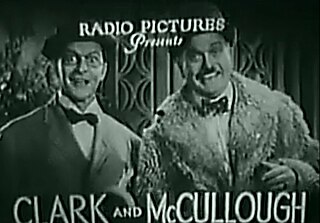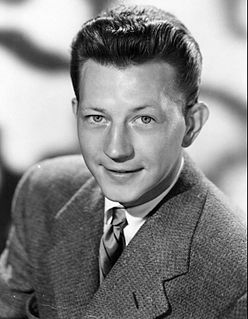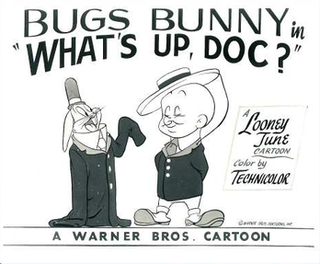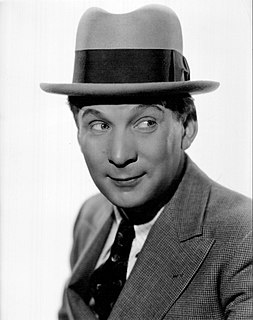Professor Lamberti | |
|---|---|
| Born | Basil Garwood Lambert January 9, 1892 Valparaiso, Indiana, U.S. |
| Died | March 13, 1950 (aged 58) Hollywood, California, U.S. |
| Years active | 1945-1953 |
| Known for | vaudeville |
| Spouse(s) | Millie |
Professor Lamberti (born Basil Garwood Lambert, January 9, 1892 – March 13, 1950) was an American vaudeville and burlesque performer active during the early part of the 20th century. He was billed as "the world's daffiest xylophonist". [1]

Vaudeville is a theatrical genre of variety entertainment born in France at the end of the 18th century. A vaudeville was originally a comedy without psychological or moral intentions, based on a comical situation: a kind of dramatic composition or light poetry, interspersed with songs or ballets. It became popular in the United States and Canada from the early 1880s until the early 1930s, but the idea of vaudeville's theatre changed radically from its French antecedent.

A burlesque is a literary, dramatic or musical work intended to cause laughter by caricaturing the manner or spirit of serious works, or by ludicrous treatment of their subjects. The word derives from the Italian burlesco, which, in turn, is derived from the Italian burla – a joke, ridicule or mockery.

The xylophone is a musical instrument in the percussion family that consists of wooden bars struck by mallets. Each bar is an idiophone tuned to a pitch of a musical scale, whether pentatonic or heptatonic in the case of many African and Asian instruments, diatonic in many western children's instruments, or chromatic for orchestral use.
He was born in Valparaiso, Indiana. [2] At age seven he appeared in minstrel shows, at nine he was a boy juggler. By his teens he was appearing with the Henderson Stock Company and at 17 he joined the Adam Forepaugh circus as a wire artist and juggler. He later became a theatre musician playing drums and xylophone. [3]

Valparaiso is a city and the county seat of Porter County, Indiana, United States. The population was 31,730 at the 2010 census.
Lamberti's musical skills were good enough to get him work with the Cleveland Symphony Orchestra. But as he once said "You can't make a living out of the xylophone if you play it right." After fighting in World War I, he began appearing in vaudeville, honing a comic xylophone act that he used successfully for many years.

World War I, also known as the First World War or the Great War, was a global war originating in Europe that lasted from 28 July 1914 to 11 November 1918. Contemporaneously described as "the war to end all wars", it led to the mobilisation of more than 70 million military personnel, including 60 million Europeans, making it one of the largest wars in history. It is also one of the deadliest conflicts in history, with an estimated nine million combatants and seven million civilian deaths as a direct result of the war, while resulting genocides and the 1918 influenza pandemic caused another 50 to 100 million deaths worldwide.
According to Lamberti, he was playing on a vaudeville bill in Topeka, Kansas when a magician's ducks escaped and wandered on the stage behind him. The audience went wild, and Lamberti decided that he would do well adding some comedy to his act. [4]

Topeka is the capital city of the U.S. state of Kansas and the seat of Shawnee County. It is situated along the Kansas River in the central part of Shawnee County, in northeast Kansas, in the Central United States. As of the 2010 census, the city population was 127,473. The Topeka Metropolitan Statistical Area, which includes Shawnee, Jackson, Jefferson, Osage, and Wabaunsee counties, had a population of 233,870 in the 2010 census.
Generally, his act would begin with Lamberti striding onstage pushing a xylophone proclaiming, "If you folks have been waiting for something lousy, here it is." Wearing an ill-fitting tuxedo, Lamberti would launch into a piece of music replete with mistakes, which were echoed on his face. As he got further into the piece, a young woman would appear behind and begin a striptease. As the audience encouraged the woman, Lamberti would mistake their excitement for encouragement of his playing. After realizing the presence of the stripper, Lamberti would chase her offstage with a seltzer bottle, thus ending the act.
Throughout the 1940s Lamberti appeared in nightclubs, and in 1942, he appeared in Michael Todd's production of Star and Garter with Bobby Clark and Gypsy Rose Lee. [5] In 1945 he performed his xylophone act in the musical Tonight and Every Night starring Rita Hayworth.
Star and Garter is a 1942 American musical revue starring comedian Bobby Clark and produced by Mike Todd. The show, which opened at Broadway's Music Box Theatre on 24 June 1942, was a smash hit, closing on 4 December 1943 after 609 performances.

Robert Edwin Clark, known as Bobby Clark, was a minstrel, vaudevillian, performer on stage, film, television and the circus. Known for his painted-on eyeglasses, he was part of a comedy team with Paul McCullough for 36 years.

Gypsy Rose Lee was an American burlesque entertainer and vedette famous for her striptease act. Also an actress, author, and playwright, her 1957 memoir was adapted into the 1959 stage musical Gypsy.
He died at Hollywood Presbyterian Hospital in 1950, two months after his 58th birthday. His wife Millie was at his side. [6]














